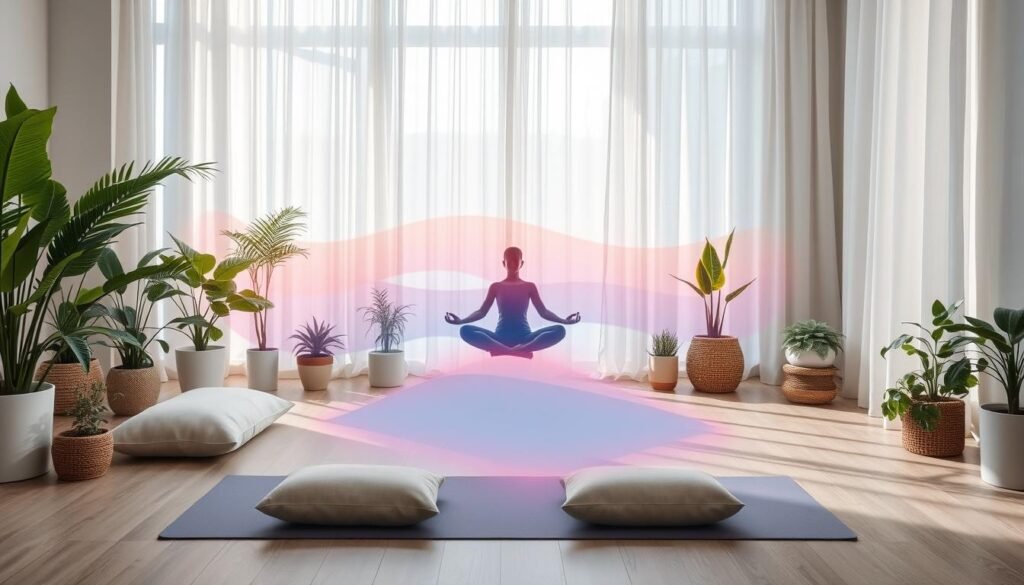A study with 185 university students lasted 6 weeks. It showed that doing aerobic exercise twice a week significantly drops stress and depression levels. This highlights how important it is to find ways to lower stress and anxiety. In today’s world, people often feel swamped. This makes finding techniques for mental and emotional health very important.
In this article, we share tips that can help you feel better right away. You will learn about mindfulness and relaxation exercises among others. These steps can help you control stress better. By managing stress well, you can enjoy better emotional health and a fuller life.
Key Takeaways
- Aerobic exercise can significantly reduce stress and anxiety levels.
- Diet plays a crucial role; high consumption of ultra-processed foods is linked to increased stress.
- Social support from friends and family aids in maintaining emotional balance.
- Mindfulness techniques can effectively decrease anxiety symptoms.
- Visualization practices have physiological impacts on stress reduction.
- Engaging in music or creative activities can enhance problem-solving abilities and promote relaxation.
- Managing smartphone usage may help in achieving better mental well-being.
Understanding Stress and Its Impact on Mental Health
Stress is something everyone can go through, no matter their age or where they come from. It’s important to know the difference between normal stress and serious issues like anxiety and depression. Chronic stress is especially dangerous. It can lead to heart disease, depression, and anxiety disorders. People dealing with it for a long time may feel very stressed, have panic attacks, or experience mood changes.
Different factors affect how we deal with stress. Our genetics can make us more likely to get stressed. Having friends and family to support us can help manage stress better. People facing financial troubles, folks from minority communities, and those with disabilities or ongoing health problems are more at risk of chronic stress.
Being stressed for a long time can cause mental health problems. People stressed from work might miss up to 24 days a year because of related health issues. Financial stress can make people feel extremely worried and increase their anxiety. Stress from facing discrimination can also harm the mental health of minority groups.
It’s key to manage stress well to avoid these problems. Enjoying hobbies, exercising daily, and trying relaxation techniques like yoga can help a lot. Tailoring stress management to fit what causes your stress can also work well. For more tips on handling stress, check out this page.
The Role of Physical Activity in Reducing Stress
Physical activity is great for managing stress and boosting mental health. Seven out of ten adults in the U.S. experience stress or anxiety daily. Many say this stress majorly affects their daily lives, showing the need for good ways to handle it.
Regular aerobic exercises like walking, running, or biking help reduce stress and anxiety. Research shows that short physical activities, even 10-minute walks, are very helpful. The Department of Health and Human Services suggests at least 150 minutes of such exercise every week for the best health.

A lot of adults exercise to deal with stress, but only 14% see it as their main way to cope. About 29% choose walking, and 20% prefer running to reduce stress. These activities not only offer fun but also decrease tension, make sleep better, and boost self-esteem.
For a more complete strategy, different exercises work well against anxiety. From strength training to aerobic exercises, each has its own benefits. Regularly taking part in these can enhance self-confidence and mood, helping manage stress effectively.
In conclusion, adding physical activity to your daily life can improve your mood and lessen anxiety. It also strengthens your ability to face challenges. Making an effort to be active can greatly improve mental and emotional health.
Mindfulness Techniques for Immediate Relief
Using mindfulness techniques daily can ease stress quickly and boost well-being. They teach us how to handle stress better, bringing peace and calmness. Key practices include diaphragmatic breathing and mindful movement with stretches.
Diaphragmatic Breathing
Diaphragmatic breathing activates the calm part of your nervous system. It involves slow breaths to reduce tension during stress. By breathing out slowly, it tells your body to relax, making you feel calm. This method not only lowers stress but also improves focus after a while.
Mindful Movement and Simple Stretches
Mindful movement and stretches can lessen the physical stress in our bodies. Neck rolls and shoulder movements release stiffness in the jaw, neck, and shoulders. Adding these to your day can make you feel more relaxed and uplift your mood. Activities like swimming and walking mindfully also help manage stress and strengthen balance and core.

| Technique | Benefits |
|---|---|
| Diaphragmatic Breathing | Engages the parasympathetic nervous system, promotes relaxation, and enhances focus. |
| Mindful Movement | Alleviates physical tension, improves balance, and supports mental clarity. |
| Simple Stretches | Relieves tightness and promotes emotional well-being. |
| Meditative Walking | Enhances core strength, eases body pain, and improves balance. |
| Mindful Drinking | Encourages presence and quiets the mental conversation. |
Relaxation Exercises to Foster Inner Peace
Integrating relaxation exercises into your life can boost mental clarity and inner peace. Guided imagery and progressive muscle relaxation are very effective. They help reduce stress and create a feeling of calm inside you.
Guided Imagery Techniques
Guided imagery is a powerful relaxation method. It lets you visualize peaceful places. Through guided imagery, feelings of comfort and safety are brought to life. This promotes deep relaxation. One can imagine being at a quiet beach or in a serene forest. This exercise helps reduce stress by taking your mind off worries. Studies show that these mental pictures can improve your emotional health.
Regularly doing guided imagery helps keep a relaxation routine.
Progressive Muscle Relaxation
Progressive muscle relaxation helps you focus on different muscle groups. First, you tense them, then relax them. It improves awareness of where your body holds stress. This technique leads to relaxation and a profound sense of calm.
Adding these exercises to your daily life can better your well-being. For more tips on relaxation, check out these mental wellness strategies.

Coping Strategies for Overwhelming Situations
Life can be tough, throwing challenges our way that feel too big to handle. It’s key to recognize our emotions to maintain emotional balance. By talking about how we feel, we can calm our minds more quickly.
Using distractions can be a powerful way to manage stress. For example, music can help us let go of our worries for a while. By regularly turning to music, we can find quick comfort when things get hard. Also, changing how we talk about our feelings can help us cope better.
Taking care of ourselves is crucial for dealing with stress. Activities like getting enough sleep, eating well, and exercising can make our emotional health stronger. These habits help us stay well, especially in stressful times.
Here’s a quick list of good ways to cope:
| Coping Strategy | Description |
|---|---|
| Vocalizing Feelings | Talking about emotions to understand them better and feel less anxious. |
| Listening to Music | Using music to distract ourselves and deal with our feelings. |
| Language Shifts | Changing negative thoughts into positive ones to feel better. |
| Physical Activity | Exercising to help reduce stress naturally. |
| Mindful Practices | Practicing mindfulness to focus on the present moment. |
Adding these strategies for quick anxiety relief to our daily lives can greatly improve how we handle stress. They are key for facing life’s problems, helping us achieve emotional stability and lessen stress a lot.
Relaxation Techniques and Meditation Practices
Exploring different meditation and relaxation methods helps us find peace. These techniques work well against stress and worry. Mindfulness meditation teaches us to live in the moment. It’s known for making stress levels drop and improving our mood. Trying guided meditation can help too. It uses stories to lead us to relax.
Various Forms of Meditation
There are many ways to meditate that can help ease stress:
- Mindfulness Meditation: It makes us pay attention to now, without judging our thoughts or feelings.
- Guided Meditation: A voice guides us to a calm state of mind through stories.
- Transcendental Meditation: We quietly repeat a special phrase to relax deeply.
- Breathing Exercises: Practices like box breathing and slow breathing help us unwind.
Creating a Personal Relaxation Routine
Making your own relaxation plan can greatly help with stress. It’s important to include different techniques and meditation practices. Here’s how to create your routine:
- Identify Preferences: Find out which methods you like best.
- Set a Regular Schedule: Pick certain times to practice and stick to them every day.
- Mix Techniques: Use a variety of ways to relieve stress. This keeps it interesting.
- Start Small: Begin with 5 to 10 minutes and then do more as you get used to it.
Using these meditation methods and techniques helps us be mindful. It lowers our anxiety and stress. By having a personal routine, we can handle tough times better.
Reduced Stress and Anxiety Through Social Support
Social support is key in making us mentally stronger and easing anxiety. Being close to family, friends, and the community helps us handle stress better. This kind of support can make tough situations easier to manage.
Strong ties with others can make us less stressed physically. This leads to a healthier life.
Having a lot of social support can make people feel less stressed. It can also make physical stress responses weaker. For example, being in supportive relationships helps release hormones that make us feel relaxed.
Being around others face-to-face is especially good for this.
- Individuals with supportive relationships report better happiness and resilience.
- Loneliness and low social support correlate highly with anxiety and depression.
- Social isolation can lead to various health issues, including cardiovascular disease and impaired immune function.
Social support gives us a sense of belonging and safety. It helps us feel less lonely, solve problems, and feel better about ourselves. Being open, listening well, and giving back are important in building supportive relationships.
| Type of Support | Benefits |
|---|---|
| Emotional Support | Reduces feelings of isolation, provides comfort during distress |
| Instrumental Support | Offers practical help in managing daily tasks or crises |
| Informational Support | Provides guidance and advice to enhance coping strategies |
| Network Support | Enhances feelings of attachment and belonging, reducing anxiety |
Keeping relationships healthy is important for getting through tough times now and for good mental and physical health later. We should all try to make and keep friends and be active in our communities. Doing this helps us become stronger and mentally healthier.
The Importance of Nutrition for Mental Well-Being
Nutrition is key for keeping our minds healthy. What we eat affects our mood and stress levels. Eating a balanced diet ensures we get important nutrients. These help us stay mentally strong and fight stress.
Maintaining a Balanced Diet
Eating fruits, vegetables, whole grains, and omega-3s helps our mood and lowers anxiety. Recent studies, mainly from 2016 to 2020, show how nutrition impacts mental health. They explain that not getting enough omega-3s and magnesium can make stress worse.
Many of us don’t get enough magnesium because processed foods lack it. This can make our body’s stress response go up. Keeping magnesium levels up is important for staying calm.
Hydration and Its Effects on Mood
Staying hydrated is crucial for our mental health. Not drinking enough water can make us moody and less sharp. People who don’t drink enough water often feel more stressed and tired.
Knowing the importance of water helps us make better choices for our mental health.
| Nutrient | Effects on Mental Health | Food Sources |
|---|---|---|
| DHA | Reduces perceived stress and prevents cortisol increase | Fatty fish, flaxseeds, walnuts |
| Magnesium | Alleviates stress and reduces anxiety symptoms | Leafy greens, nuts, whole grains |
| Polyphenols | Associated with reduced depression risk | Fruits, vegetables, tea |
Conclusion
In today’s world, many people are feeling more stressed. They discover that using good stress management techniques makes a big difference. By practicing mindfulness like meditation and deep breathing, they handle life’s ups and downs better. Mindfulness therapies are proven to boost emotional strength and lessen anxiety.
Eating well is also crucial in managing stress. A healthy diet boosts mood and energy. Making small changes in lifestyle helps in fighting anxiety. It’s important to take care of both your body and mind.
Using these methods together can lead to less stress and worry. Support from loved ones and seeking help when needed is key. People can achieve a calm and balanced life. For more tips, especially on therapy options like CBT, check out this resource. These strategies help build a happier, more resilient life.